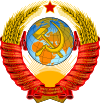战间期德国与苏联关系
此条目目前正依照其他维基百科上的内容进行翻译。 (2022年3月10日) |
 | |
德国 |
苏联 |
|---|---|
 | |
德意志国 |
苏联 |
|---|---|
战间期德国与苏联关系指自布列斯特和约签订至苏德战争爆发期间双边关系史。1918年3月3日,由德国主导的《布列斯特-立陶夫斯克条约》签署,此条约结束了德国与苏俄(苏联前身)的战争状态。[1]几个月后,德国驻莫斯科大使威廉·冯·米尔巴赫被俄罗斯左翼社会革命党人枪杀,左翼社会革命党人试图借此重启俄罗斯与德国之间的战争。1918年11月6日,阿道夫·约夫领导的整个苏联大使馆因为他们积极支持德国革命而被驱逐出德国。卡尔·拉狄克还于1919年在魏玛德国非法支持共产主义颠覆活动。
从一开始,两个国家都试图为推翻第一次世界大战战胜国所建立起的新秩序而努力。战后德国在繁重的赔款下苦苦挣扎,并被《凡尔赛条约》的集体责任条款刺痛,是一个饱受战后政治动乱困扰的战败国。这场战争和俄国内战使德国和苏联都成为国际社会的弃儿,这令他们在战间期的关系迅速升温。[2][3]同时,他们关系的动态是由缺乏信任和各自政府担心其伙伴摆脱外交孤立而转向法国第三共和国(当时被认为拥有欧洲最大的军事力量)和其盟友波兰第二共和国形成的。1933年,阿道夫·希特勒上台后,两国的经济关系联系逐渐减少;然而,两国的关系在20世纪30年代末再升温,1939年的《莫洛托夫-里宾特洛甫条约》和双边贸易协定使两国关系达到顶峰。
关于二战爆发的起因,很少有问题比约瑟夫·斯大林领导下的苏联和在纳粹党夺取德国政权至1941年6月22日德国入侵苏联期间对纳粹德国的外交政策问题更有争议性和意识形态色彩。[4]关于苏联对德国如此的外交政策存在各种相互竞争和相互矛盾的论点,包括苏联寻求欧洲资本主义国家发起一场互相残杀的大战争借此削弱资本主义国家;[5]或是苏联奉行纯粹的防御政策;[6]苏联试图避免卷入战争等,而这又有苏联领导人认为苏联当时没有进行战略行动的军事能力的因素。[7]
苏俄和魏玛德国
[编辑]革命与一战的结束
[编辑]

第一次世界大战给魏玛德国与苏俄带来了灾难性的后果。一战后期,布尔什维克为寻求政权生存被迫与德国和谈。布尔什维克在面对德国的军事推进的巨大威胁下,列宁和托洛茨基被迫签订了《布列斯特-立陶夫斯克和约》。[8] 和约将俄罗斯西部的大片领土割让给德意志帝国。1918年11月11日,德国人与协约国签署停战协议,结束一战西线战事。德国崩溃后,英国、法国和日本军队介入俄罗斯内战。[9]
起初,苏联领袖希望德国的社会主义革命胜利,作为其“世界革命”的一部分。然而,德国革命最终被右翼的自由军团镇压。随后,布尔什维克卷入了1919-20年与波兰的战争之中。由于波兰是德国的“老敌人”,而且新生的苏维埃俄国也在国际上被广泛孤立,因此,苏维埃政府开始寻求与德国建立更紧密的关系,也因此在外交政策上,对德国采取了更少的敌对性外交政策。在外交事务人民委员格奥尔基·契切林和苏联大使尼古拉·克里斯廷斯基的领导下,这一外交路线得到持续的推行。在谈判中起作用的其他苏联代表有卡尔·拉狄克、列昂尼德·克拉辛、克里斯蒂安·拉科夫斯基、维克多·科普和阿道夫·阿布拉莫维奇·越飞。
参考文献
[编辑]引用
[编辑]- ^ Full text in English: The Peace Treaty of Brest-Litovsk; March 3, 1918 (页面存档备份,存于互联网档案馆)
- ^ Gasiorowski, Zygmunt J. (1958). The Russian Overture to Germany of December 1924 (页面存档备份,存于互联网档案馆). The Journal of Modern History 30 (2), 99–117.
- ^ Large, J. A. (1978). The Origins of Soviet Collective Security Policy, 1930–32 (页面存档备份,存于互联网档案馆). Soviet Studies 30 (2), 212–236.
- ^ Haslam, Jonathan (1997). "Soviet-German Relations and the Origins of the Second World War: The Jury Is Still Out". The Journal of Modern History 69: 785–797.
- ^ Raack, R. C. Stalin's Drive to the West, 1938–1945: The Origins of the Cold War. Stanford, California, 1995, p. 12.
- ^ Geoffrey Roberts, The Soviet Union and the Origins of the Second World War: Russo-German Relations and the Road to War 1933–1941 (New York, 1995), p. 73.
- ^ Haslam, Jonathan. The Soviet Union and the Struggle for Collective Security in Europe, 1933–39. New York, 1985, pp. 140–41.
- ^ The Peace Treaty of Brest-Litovsk - World War I Document Archive. wwi.lib.byu.edu. [2022-03-10]. (原始内容存档于2020-02-27).
- ^ Montefiore 2005, p. 32
书籍
[编辑]- Erickson, John, The Soviet High Command: A Military-political History, 1918–1941, Routledge, 2001, ISBN 0-7146-5178-8
- Ericson, Edward E., Feeding the German Eagle: Soviet Economic Aid to Nazi Germany, 1933–1941, Greenwood Publishing Group, 1999, ISBN 0-275-96337-3
- Grenville, John Ashley Soames; Wasserstein, Bernard, The Major International Treaties of the Twentieth Century: A History and Guide with Texts
 , Taylor & Francis, 2001, ISBN 0-415-23798-X
, Taylor & Francis, 2001, ISBN 0-415-23798-X - Hehn, Paul N., A Low Dishonest Decade: The Great Powers, Eastern Europe, and the Economic Origins of World War II, 1930–1941, Continuum International Publishing Group, 2005, ISBN 0-8264-1761-2
- Nekrich, Aleksandr Moiseevich; Ulam, Adam Bruno; Freeze, Gregory L., Pariahs, Partners, Predators: German-Soviet Relations, 1922–1941, Columbia University Press, 1997, ISBN 0-231-10676-9
- Montefiore, Simon Sebac. Stalin: The Court of the Red Tsar 5th. The United Kingdom: Phoenix. 2005 [2003]. ISBN 0-7538-1766-7.
- Philbin III, Tobias R., The Lure of Neptune: German-Soviet Naval Collaboration and Ambitions, 1919 – 1941, University of South Carolina Press, 1994, ISBN 0-87249-992-8
- Roberts, Geoffrey, Stalin's Wars: From World War to Cold War, 1939–1953, Yale University Press, 2006, ISBN 0-300-11204-1
- Shirer, William L., The Rise and Fall of the Third Reich: A History of Nazi Germany, Simon and Schuster, 1990, ISBN 0-671-72868-7
- Wegner, Bernd, From Peace to War: Germany, Soviet Russia, and the World, 1939–1941, Berghahn Books, 1997, ISBN 1-57181-882-0
扩展阅读
[编辑]- Carr, Edward Hallett. German-Soviet Relations between the Two World Wars. Baltimore: Johns Hopkins Press, 1951.
- Ericson, Edward E. Feeding the German Eagle: Soviet Economic Aid to Nazi Germany, 1933–1941. New York: Praeger, 1999. ISBN 0-275-96337-3
- Everett, Rob. "The Enemy of My Enemy is My Friend: Soviet Foreign Policy in Europe, 1933-1939." Wittenberg History Journal 43 (2014): 53–64. online (页面存档备份,存于互联网档案馆)
- Gorodetsky, Gabriel. "The impact of the Ribbentrop-Molotov pact on the course of Soviet foreign policy." Cahiers du monde russe et soviétique (1990): 27–41. online (页面存档备份,存于互联网档案馆)
- Hill, Alexander. "Soviet Planning for War, 1928–June 1941." in by Thomas W. Zeiler and Daniel M. DuBois, eds. A Companion to World War II (2013): 93–101.
- Himmer, Robert "Rathenau, Russia, and Rapallo." Central European History 9#2 (1976): 146–183.
- Hoppe, Bert, and Mark Keck-Szajbel. "Iron Revolutionaries and Salon Socialists: Bolsheviks and German Communists in the 1920s and 1930s." Kritika: Explorations in Russian and Eurasian History 10.3 (2009): 499–526.
- Jelavich, Barbara. St. Petersburg and Moscow: tsarist and Soviet foreign policy, 1814-1974 (Indiana UP, 1974) pp 311–58.
- Kochan, Lionel. Russia and the Weimar Republic. Cambridge: Bowes & Bowes, 1954.
- Kocho-Williams, Alastair. Russian and Soviet Diplomacy, 1900-39 (Springer, 2011).
- Kshyk, Christopher J. "Did Stalin Plan to Attack Hitler in 1941? The Historiographical Controversy Surrounding the Origins of the Nazi-Soviet War." Inquiries Journal 7.11 (2015). online (页面存档备份,存于互联网档案馆)
- Mueller, Gordon H. "Rapallo Reexamined: a new look at Germany's secret military collaboration with Russia in 1922." Military Affairs 40#3 (1976): 109–117. in JSTOR (页面存档备份,存于互联网档案馆)
- Nekrich, Aleksandr Moiseevich. Pariahs, partners, predators: German-Soviet relations, 1922-1941 (Columbia University Press, 1997).
- Pohl, J. Otto, Eric J. Schmaltz, and Ronald J. Vossler. "'In our hearts we felt the sentence of death': ethnic German recollections of mass violence in the USSR, 1928–48." Journal of Genocide Research 11.2-3 (2009): 323–354. online (页面存档备份,存于互联网档案馆)
- Pons, Silvio. Stalin and the inevitable war, 1936-1941 (Routledge, 2002).
- Rosenbaum, Kurt. Community of Fate: German-Soviet Diplomatic Relations 1922-1928 Syracuse University Press, 1965
- Saul, Norman E. Historical Dictionary of Russian and Soviet Foreign Policy (Rowman & Littlefield, 2014). 700 entries, 326pp
- Shore, Zachary. What Hitler Knew: The Battle for Information in Nazi Foreign Policy (Oxford UP, 2002).
- Ulam, Adam B. Expansion and Coexistence: The History of Soviet Foreign Policy, 1917-1973 (1974) pp 126-313.
- Uldricks, Teddy J. "The Icebreaker Controversy: Did Stalin Plan to Attack Hitler?." Slavic Review 58.3 (1999): 626–643.
- Uldricks, Teddy J. "War, politics and memory: Russian historians reevaluate the origins of world war II." History & Memory 21.2 (2009): 60–82. online (页面存档备份,存于互联网档案馆)
- Weinberg, Gerhard L. Germany and the Soviet Union: 1939-1941 (Brill, 1972).
- Weinberg, Gerhard L. The Foreign Policy of Hitler's Germany: Starting World War II 1937-1939 (1980)
- Weinberg, Gerhard L. Hitler's Foreign Policy 1933-1939: The Road to World War II (2005)
- Wheeler-Bennett, John W. "Twenty Years of Russo-German Relations: 1919-1939" Foreign Affairs 25#1 (1946), pp. 23–43 online (页面存档备份,存于互联网档案馆)
主要来源
[编辑]- Sontag, Raymond James, and James Stuart Beddie, eds. Nazi-Soviet relations, 1939-1941: Documents from the archives of the German foreign office (US Department of State, 1948) online (页面存档备份,存于互联网档案馆).
外部链接
[编辑]- Nazi-Soviet Relations 1939–1941 (页面存档备份,存于互联网档案馆) @ Avalon Project
- Nazi-Soviet Relations 1939–1941 (页面存档备份,存于互联网档案馆) @ All World Wars
- (俄语)Пронин А.А., Советско-германские соглашения 1939 г. Истоки и последствия//Международный исторический журнал, №№ 10–12, 2000 (页面存档备份,存于互联网档案馆)

